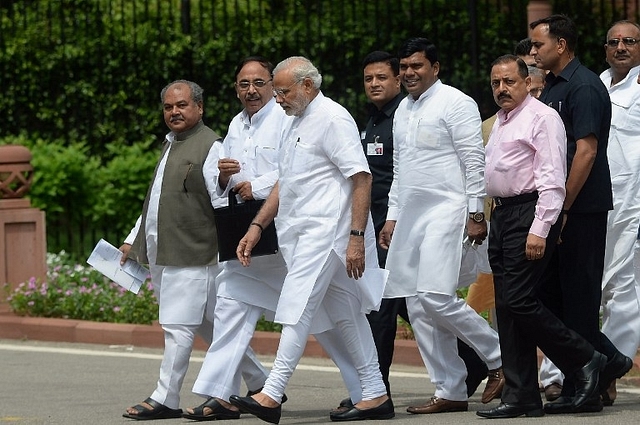
The Maker
Contrary to the campaign of his influential detractors, Narendra Modi is neither a breaker of traditions nor a desecrator of institutions. He is more in the mould of an optimizer and reformer. And his preservation instincts come to the fore when the finest things need succour and care.
Protocol impressed on Prime Minister Modi’s presence at the funeral of A. P. J. Abdul Kalam. His rendition of state duty, however, was heartfelt and sincere. He led the nation in mourning for an outstanding former head of state. In doing so, he exalted the presidency.
There was some avoidable controversy about the Vice-President and his absence from the official celebrations of World Yoga Day. Protocol does not permit the Prime Minister to be chief guest at a function where the Vice President is also invited.
In line with this tradition, the Prime Minister alone conducted the government function. A Bharatiya Janata Party official gratuitously attacked the Vice President for his non-appearance at the Rajpath celebration of yoga day. When the Vice President’s office clarified the situation, Modi-baiters grasped at the opportunity.
What did the government do? The Prime Minister’s Office revealed its displeasure at the comments made against the Vice President. Before the evening was over, the government had apologized to the Vice President. The PM’s detractors did not expect this.
This is the quintessential Modi.
Historians, among others, would counter that the Modi government is destroying historical institutions. How good were they in the first place that they cannot, in principle, do with reform? The country presently is deficient of world-class historians. Those plying the trade are fixated with current affairs, fear to progress beyond M. K. Gandhi and Jawaharlal Nehru, shrink from the world of grand ideas, and possess the tritest understanding of historical processes.
The other heartburn is the dismantling of the Planning Commission. Narendra Modi took a step long deferred. He has also moved to reform the higher judiciary. If judicial appointments are streamlined and strengthened for integrity with the participation of other estates, as in the West, that cannot do harm. In any case, the Supreme Court as the custodian of the Constitution will have the last word.
Or take the subject of the Reserve Bank governor’s exclusive rate-setting mandate and alleged attempts to dilute his powers. There is nothing to suggest that Prime Minister Modi is keen in that direction. If anybody knows the importance and significance of the Reserve Bank’s real and manifest independence in monetary policy-making to gain investor trust in the Indian economy, it is Modi. Modi trusts and respects the governor, Raghuram Rajan. He has said as much in public. This is not an institution-breaker speaking.
There is something more which is not entirely in the public domain. Prime Minister Modi has a most astute understanding of that institution called the civil services. He is determined to reform it but at a pace that won’t invite insuperable opposition. He knows the strengths and limitations of the three principal services, the IAS, IPS and IFS, and some of his key appointments reflect that insight. One should not take Modi lightly when it comes to matters of establishment.
How does all this square with pursuit of power? As reforming is time-consuming and draining, is Modi less of a power-pursuer? By no means. It is a question of ends and means. Modi’s ends are clear. He wants India to be a prosperous and developed nation. He is committed to peaceful rise without compromising on national security. But he is not prepared to take shortcuts. Means matter as much to him as ends.
This being so, he can hardly be a wrecker. He isn’t. He knows it is easy to wreck and difficult to build. Rebuilding India will be a long and hard task. It is evident that Prime Minister Modi is consumed by his responsibilities. When a “guide” like the late Abdul Kalam comes along, he feels even more energized and emboldened in his mission.
In the early 1980s, long before reaching the summit of public adulation, Abdul Kalam battled the reactionary forces in the Defence Research and Development Organization (DRDO). Numerous DRDO scientists told this writer then how they wished he led the organization. He was a fine team leader and never usurped credit for R & D that others deserved. DRDO was a bad place to work (one of this writer’s friends died a broken man when his lab was arbitrarily dismantled) till Kalam cleaned up the mess in a gentle, firm and meritocratic manner.
It is appropriate that Narendra Modi looked up to him as the rest of the nation did. Towards the course of institutional preservation, reform and optimization, Abdul Kalam’s example has driven him with a vigour and vitality that quite matches his own inner urges. All that the nation now hopes is for the pace of change not to flag.